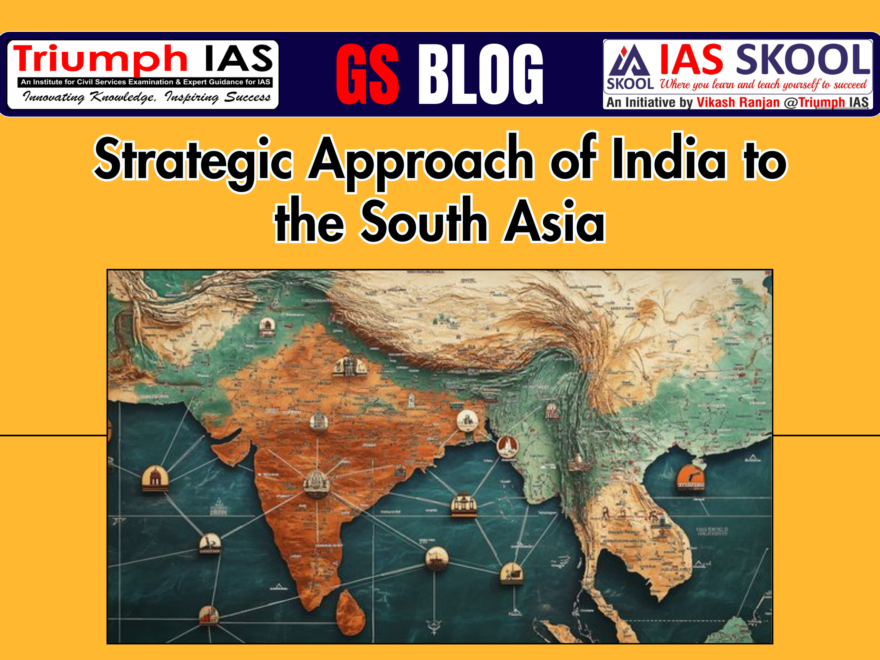Strategic Approach of India to the South Asia
India faces significant challenges in South Asia as strained relations with neighbors like Nepal, Maldives, and Bangladesh highlight dissatisfaction with its traditional diplomatic approach. The reliance on geographic dominance and assertive policies is proving less effective, as smaller nations increasingly turn to China to counterbalance India’s influence. To address this, India must transition from a “Neighborhood First” policy to a more inclusive “Neighborliness First” approach. This strategy should focus on fostering mutual respect, non-interference, and actively addressing the aspirations and concerns of smaller nations to rebuild trust and strengthen regional ties.
Importance of the Neighbourhood First Policy for India
Strategic Security Imperatives
- India’s extensive land borders (15,106.7 km) and coastline (7,516.6 km) make regional stability essential for national security.
- The policy counters China’s “String of Pearls” strategy, which seeks to encircle India with military and commercial outposts.
- Collaborative security efforts, such as the India-Maldives-Sri Lanka maritime exercise ‘Dosti’, reinforce regional unity in securing shared waters.
Economic Integration and Growth
- South Asia, with a population of over 2 billion, holds immense economic potential.
- India’s exports to SAARC nations average 5.9% of its total trade, underscoring the region’s growing economic significance.
- Infrastructure projects like the India-Myanmar-Thailand Trilateral Highway and the Chabahar Port development in Iran enhance trade connectivity.
- These initiatives align with India’s vision of becoming a $5 trillion economy by 2025.
- Energy Security and Resource Management
- Regional collaboration is critical for managing shared water resources like the Ganges, Brahmaputra, and Indus rivers.
- Meeting rising energy demands requires partnerships, exemplified by India’s approval for Nepal to export an additional 251 MW of electricity, marking the first instance of Nepal supplying power to Bihar.
- Agreements like the Bangladesh, Bhutan, India, Nepal (BBIN) Power Trade Agreement promote efficient cross-border energy sharing.
Cultural and Civilizational Bonds
- Shared historical, cultural, and religious ties across the region create a foundation for cooperation.
- Initiatives such as the Buddhist Circuit tourism and the South Asian University in Delhi strengthen cultural diplomacy and regional understanding.
- These efforts help combat anti-India narratives and foster goodwill among neighbors.
Maritime Domain Awareness and Control
- India’s strategic position along key Indian Ocean trade routes underscores the importance of regional maritime cooperation.
- The Information Fusion Centre-Indian Ocean Region (IFC-IOR) enhances maritime domain awareness with regional partners.
- Coastal security collaborations combat maritime crimes, as demonstrated by the March 2024 joint operation involving the Indian Navy, NCB, and Gujarat ATS, which seized 3,300 kg of drugs off the Indian Ocean coast.
Global Power Aspirations
- Regional influence strengthens India’s global leadership ambitions, particularly as a voice for the Global South.
- Active participation in organizations like BIMSTEC showcases India’s regional stewardship.
- Effective regional cooperation bolsters India’s bid for permanent membership in the UN Security Council (UNSC) and advances initiatives like the International Solar Alliance (ISA).
- India’s Neighbourhood First Policy is pivotal for fostering regional stability, driving economic growth, ensuring energy security, and enhancing India’s global stature. By building trust and strengthening ties, India can cement its role as a responsible and influential regional power.
Key Challenges India Faces in the South Asian Region
Territorial Disputes
- Territorial disputes continue to be a major obstacle to peace and cooperation in South Asia.
- The ongoing Kashmir conflict between India and Pakistan exacerbates tensions, while unresolved border disputes with China add further complexity.
- India’s recent decision to skip the 2025 Champions Trophy (Cricket) in Pakistan reflects the broader difficulties in normalizing such relationships.
- These disputes often lead to military standoffs and diplomatic crises, such as the 2020 Galwan Valley clash, which distract from regional development cooperation.
Rising Chinese Economic Influence and Debt Diplomacy
- China’s Belt and Road Initiative (BRI) has significantly increased its presence in South Asia, with investments surpassing $200 billion in the region.
- Sri Lanka’s Hambantota Port, leased to China for 99 years after a debt default, exemplifies China’s debt-trap diplomacy.
- Pakistan has received over $62 billion in investments through the China-Pakistan Economic Corridor (CPEC), while China committed NPR 254.7 billion to Nepal in 2023-24, representing 51.4% of Nepal’s total foreign investment.
- Even Bangladesh, a historically close ally of India, has accepted Chinese investments worth $26 billion for infrastructure projects.
- This growing Chinese economic influence directly challenges India’s role as the region’s primary development partner.
Diminishing Political Capital and Trust Deficit
- Recent political shifts have exposed India’s diminishing influence. For instance, the Maldives’ newly elected President has called for the removal of Indian military presence.
- Nepal, under Prime Minister K P Oli, has shown a clear pro-China tilt, with lingering tensions from India’s perceived interference during Nepal’s 2015 constitution-making process and the unofficial blockade that followed.
- Bangladesh’s new government, led by Mohammed Yunus, marks a shift away from the previously India-friendly regime.
- Myanmar’s political instability, following a military coup and ongoing civil conflict, complicates India’s Act East Policy and the management of its northeastern border.
Security Challenges and Strategic Vulnerabilities
- The China-Pakistan military alliance has become a more sophisticated threat, with Pakistan acquiring advanced Chinese military technology, including J-10C fighters and Type 054A/P frigates.
- Piracy incidents have risen by 20% in 2023, with notable attacks, such as the hijacking of the MV Chem Pluto off India’s west coast, highlighting the evolving threat of maritime terrorism.
- Pakistan’s continued support for cross-border terrorism, evidenced by the recent Reasi terror attack, remains a significant and persistent threat to India.
Economic Integration Barriers
- The inefficiency of SAARC due to India-Pakistan tensions has hindered regional economic integration.
- Intraregional trade in South Asia accounts for only 5% of total trade, compared to 25% within the ASEAN region.
- The Bangladesh, Bhutan, India, Nepal (BBIN) initiative has made slow progress, particularly in implementing the Motor Vehicles Agreement, which demonstrates challenges in regional connectivity.
- Delays in cross-border infrastructure projects, such as the India-Nepal Pancheshwar Multipurpose Project (under the Mahakali Treaty of 1996), highlight the difficulties in regional cooperation.
Resource and Environmental Challenges
- Water-sharing disputes are escalating, especially India’s unresolved Teesta river agreement with Bangladesh.
- China’s extensive dam-building activities on rivers flowing from its upper riparian position are increasingly threatening India’s water security, particularly by reducing the flow of vital rivers like the Brahmaputra.
- Climate change is exacerbating challenges, with rising sea levels threatening the Maldives and Bangladesh, potentially causing mass displacement and regional instability.
- Growing energy security concerns, as India competes with China for access to regional resources, are evident in the race for Myanmar’s gas fields and Sri Lanka’s energy projects.
Cultural and Identity Politics
- The rise of religious nationalism in neighboring countries complicates India’s secular diplomatic approach.
- The treatment of minorities, such as Hindus in Pakistan and Bangladesh, generates domestic political pressures on Indian foreign policy.
- The Rohingya refugee crisis further strains regional resources and challenges relationships in South Asia.
- Domestic policies, like the Citizenship Amendment Act (CAA), have affected India’s ties with Bangladesh, where concerns about potential refugee influxes remain a sensitive issue.
These challenges reflect the complex and evolving dynamics of India’s relations with its South Asian neighbours, requiring careful management of territorial, economic, political, and cultural factors to maintain stability and foster cooperation in the region.

Measures India Can Adopt to Strengthen Its Neighbourhood First Policy
Economic Integration and Trade Facilitation
- Initiate a Comprehensive Economic Partnership Agreement (CEPA) specifically with South Asian neighbors, reducing tariffs and streamlining customs procedures.
- Establish Special Economic Zones (SEZs) in border areas with Nepal, Bangladesh, and Myanmar to promote cross-border trade and local development.
- Develop integrated check posts (ICPs) with modern facilities, single-window clearance, and digital payment systems to minimize trade barriers.
- Launch a regional e-commerce platform to enable direct business-to-business and business-to-consumer transactions within the region.
Infrastructure and Connectivity Enhancement
- Expedite the completion of projects like the India-Myanmar-Thailand Trilateral Highway and extend it to Cambodia and Vietnam.
- Develop multi-modal transport corridors connecting Indian ports to landlocked neighbors via rail, road, and inland waterways.
- Establish cross-border energy grids and gas pipelines to create an integrated regional energy market.
- Modernize border infrastructure with advanced surveillance systems, improved roads, and better trading facilities.
- Fully implement the BBIN Motor Vehicles Agreement with technology-based tracking and documentation systems.
Digital and Technology Cooperation
- Create a South Asian Digital Hub for sharing expertise in fintech, e-governance, and digital public infrastructure.
- Extend India Stack technologies (e.g., UPI and Aadhaar) to neighboring countries to facilitate cross-border digital transactions.
- Establish a regional cybersecurity coordination center to combat cyber threats and share intelligence. Launch dedicated satellites to improve regional connectivity and disaster management.
Cultural and Educational Exchange
- Increase Indian Council for Cultural Relations scholarships for students from neighboring countries, focusing on technical and professional courses.
- Establish more South Asian Universities in border states, emphasizing regional languages, culture, and development studies.
- Create a Regional Cultural Circuit linking Buddhist, Islamic, and Hindu heritage sites across borders.
- Launch joint media initiatives, including content co-productions and journalist exchange programs.
Security Cooperation Framework
- Establish a Regional Counter-Terrorism Coordination Center with real-time intelligence-sharing capabilities.
- Create joint border management teams with neighboring countries for coordinated patrols and crisis response.
- Develop a shared maritime domain awareness platform with automated vessel tracking and threat assessment.
Environmental and Resource Management
- Establish a Regional Climate Action Task Force for a coordinated response to environmental challenges.
- Implement shared early warning systems for natural disasters and environmental emergencies.
- Create a regional carbon trading market to promote sustainable development and climate action.
Skill Development and Employment
- Launch a Regional Skill Development Initiative targeting sectors with high employment potential.
- Set up cross-border industrial training institutes with standardized certification systems.
- Develop regional labor market information systems to better match skills with demand.
- Implement mutual recognition of professional qualifications across the region.
Local Government Cooperation
- Establish Sister City partnerships between border cities to foster cultural and economic cooperation.
- Create Joint Development Councils for border districts, focusing on coordinated planning.
- Develop integrated urban planning for border cities with shared facilities.
- Set up mechanisms for regular interaction between local government officials to improve cooperation.
Green Border Initiative
- Establish cross-border renewable energy corridors with joint solar and wind projects operated by neighbouring countries.
- Create Green Buffer Zones along borders, involving joint forest management and biodiversity conservation.
- Develop shared waste management and recycling facilities in border regions.
- Launch joint climate-resilient agriculture projects in border areas to address environmental challenges.
By adopting these measures, India can significantly enhance its Neighbourhood First policy, fostering deeper regional cooperation, stability, and sustainable growth across South Asia.
The path forward for India in South Asia demands a fundamental change in its approach to its neighbours. A sincere commitment to mutual development, non-interference, and addressing shared concerns is essential. By focusing on economic integration, tackling security challenges, and promoting cultural exchange, India can reaffirm its leadership role in the region and usher in an era of peace, prosperity, and collective progress in South Asia
The End of the Blog: Strategic Approach of India to the South Asia

|



















One comment